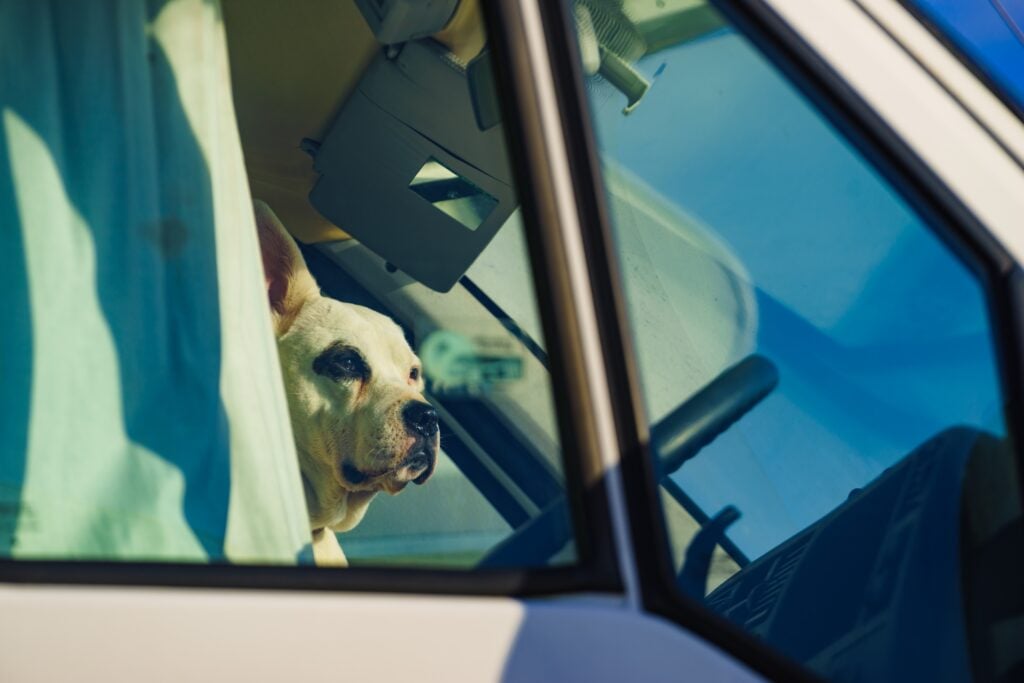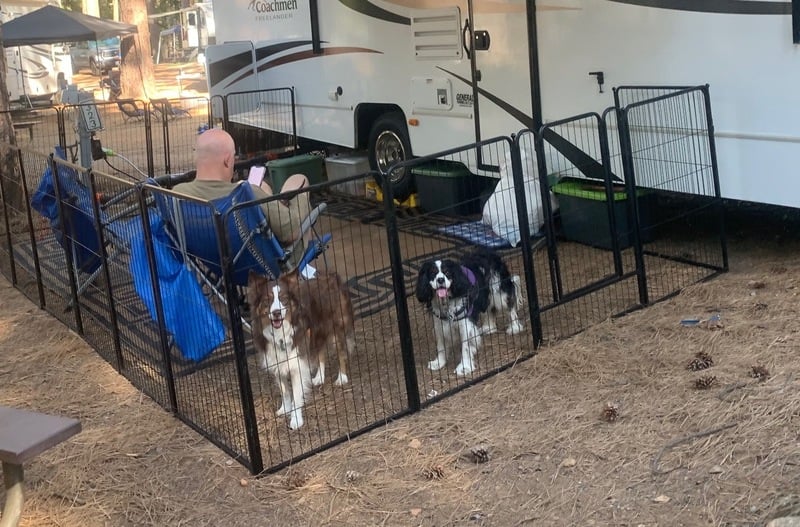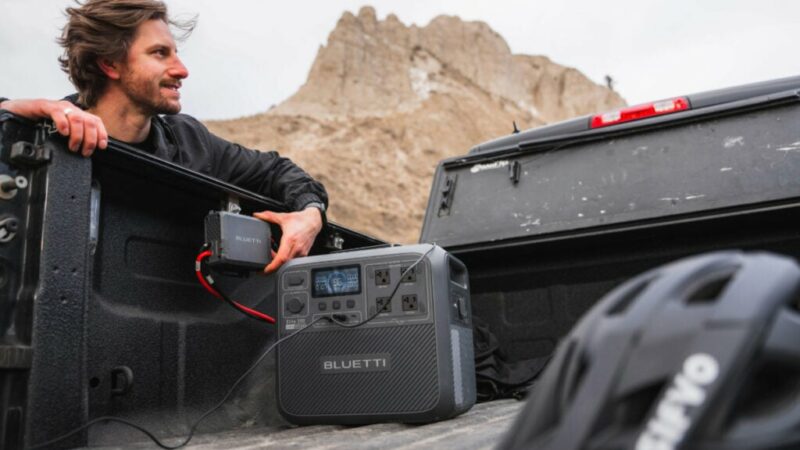Are You Prepared For Pet Emergencies While RVing?

How To Deal With Pet Emergencies While Traveling In An RV
As RVers, we love adventure. We also love to bring our pets along to share that adventure with us. But, what do we do if we have a pet emergency? It’s up to us to take care of our furry friends, so let’s take a look at what we might need to think about and bring along when we travel.
Let’s also look at what pet items need to be on our packing list and what common emergencies might occur.
Travel with your pet’s records
Bringing along your pet’s records is a first step towards making sure your pet is well taken care of on your RV trip. If you have a pet emergency, the attending vet will want to know all the details of your pet’s health. You may need to present vaccination records for a variety of reasons such as crossing a border, if your pet should bite someone, or if your own emergency requires your pet to stay in a boarding kennel.
At a minimum, make sure you have all these items on hand and that they are readily accessible.
- Vaccination records or titer test results
- Medication names and dosage amounts
- Heartworm test results
- Microchip information
- Your dog’s allergies
- Your primary veterinarian’s contact information
- Pet insurance plan information
Map out veterinary services when you arrive
You don’t want to wait until you have a pet emergency to figure out where you can go. Doing a quick internet search could save you time later. You can also ask anyone local where the best veterinary services are located. You can also find pet hospitals and pet stores along your route, as well as campgrounds and other points of interest, while planning your trip with RV LIFE Trip Wizard.
Bring a first aid kit
Packing a first aid kit for your pet is very important. There are some things you can treat, such as cuts or wounds, before you head to the vet’s office. These items will help with basic first aid.
- Gauze
- An extra leash and collar
- Non-stick bandages
- Pet thermometer
- Cotton balls
- Hydrogen peroxide
- Antibiotic spray for dogs
- Tweezers
- Tick tweezers
- Flashlight
- Towel
- Soft muzzle
- Emergency pet medications
Consider virtual vet care
There are also a number of ways that you can chat with a veterinarian online. Keep these websites handy if you need to get some advice during a pet injury. The sites listed have immediate chats available, so you don’t need to wait for an appointment. You will likely still need to bring your dog to a vet clinic or an emergency clinic, but you can get advice on non-life-threatening injuries or illnesses.
- Chewy.com: There are free veterinarians that will chat with you live.
- Justanswer.com: This site also has the option to chat with a veterinarian or vet tech.
- Askaveterinarianonline.com: There is a team of vets available online 24/7 and even on holidays.

What to do in a pet emergency
Assess the problem
Depending on your pet’s symptoms, get as much information as you can quickly. The responding veterinarian will want to know as much information as possible.
Problems such as a broken bone or an unconscious pet will not take a lot of assessment. If one of these happens, get your pet to a vet as soon as possible.
Respond as much as possible in the moment
If your pet is bleeding, you will need to find a way to stop or stem the bleeding before you continue to the vet.
Call the vet or emergency vet
As soon as possible, call a veterinarian or emergency vet. If you are unsure if this is truly an emergency, you should still speak to a vet or chat with a virtual vet. They can tell you if you have a true emergency. If it is after hours or on a weekend or holiday, go to the emergency vet you already scoped out when you got to your campsite.
Calm your pet as much as possible
If your pet has been injured or is in pain, they might be extremely agitated and even the nicest pet could bite. Make sure you approach your pet slowly and calmly. Use a soft muzzle that you have in your pet’s first aid kit if needed. If your pet is already muzzled when you get to the vet, they can get to work quickly with medical treatment.
Types of emergencies
While it isn’t practical to be overly anxious for your pet’s health while you are RVing, there are sometimes accidents or injuries that just happen. Here are a few common ways that your pet could be injured.
Accidents/Injuries
There are several types of accidents or injuries that could occur when you are RVing with dogs or cats. These could include bite wounds from dogs or other animals, swallowed objects, fractures, torn ligaments or muscles, or lacerations, to name a few.
Boots or foot coverings for dogs are great when you get out on the trails. These can help protect their feet from stickers, cuts, and more. They are also essential when the pavement is hot.
Water toxicity
Water intoxication, also known as hyponatremia, is a potentially fatal condition. Dogs that play in the water and participate in water games that involve retrieving items or diving into pools to catch toys can be subject to water intoxication. Dogs that play with water from sprinklers or hoses are vulnerable also.
Excessive amounts of water cause the body to lose sodium and the cells begin to fill with water and swell. If the cells in the brain swell, it can affect the central nervous system. Symptoms include loss of coordination, lethargy, bloating, vomiting, glazed eyes, excessive salivation, difficulty breathing, seizures, and coma. If your dog has been playing in the water and has any of these symptoms, get them to a veterinarian immediately.
Limiting your dog’s water time and allowing them to take frequent breaks will help to prevent water intoxication.
Plant toxicity
While enjoying the great outdoors, there are plenty of plants your dog could get near to or possibly ingest. Some of them could be toxic and make your dog sick or even cause death.
One of the plants that is most toxic to dogs is the Sago Palm. These are popular in warm climates and are said to be very tasty to dogs. They can cause liver failure and possible death.
Milkweed is another very common plant that is highly toxic to dogs. It will induce vomiting and diarrhea, but your dog could also experience difficulty breathing, rapid and weak pulse, dilated pupils, and even kidney or liver failure.
If your dogs like to eat things off the ground, it might be a good idea to purchase a guard. Outfox has one that allows your dog to pant but keeps them from picking up junk from the ground. It kind of looks like a beekeeper’s netting.
Overheating
Overheating is also a common emergency for pets. If your pet’s body temperature rises above a healthy range and they can’t regulate their own body heat, they can have hyperthermia. The stages of this can go from mild heat exhaustion to severe heatstroke. At this point, your pet could lose consciousness, run a high fever, or even experience organ failure.
Preventing overheating includes limiting time outside, avoiding walking during peak temperature hours, making sure your pet has plenty of water, and knowing your pet’s tolerance for heat. Pets with known heart conditions, ones that have flatter faces, or are just not in the best shape should be kept inside or left at home if you are RVing in high heat.
If you think your pet might have heat exhaustion, take them to a cooler area or indoors immediately. Apply cool or lukewarm water to their ears and paws. Do not use cold water. You can also put them in front of a fan. Call your veterinarian immediately.
Signs of heat exhaustion for dogs include excessive panting or trouble breathing, drooling, lethargy, muscle tremors, dizziness, and vomiting or diarrhea.
Get tips from other RVers
While you should be prepared for the worst when it comes to your pet’s health during your time RVing, don’t let the fear of something going wrong ruin your fun. If you take this advice, you should be well-prepared for any pet emergency.
One of the best parts about RVing is engaging with the community of traveling enthusiasts. iRV2 forums allow folks to chat with other RVers online, and get other perspectives on everything RVing, including products, destinations, RV mods, and more.
The post Are You Prepared For Pet Emergencies While RVing? appeared first on RV LIFE.






